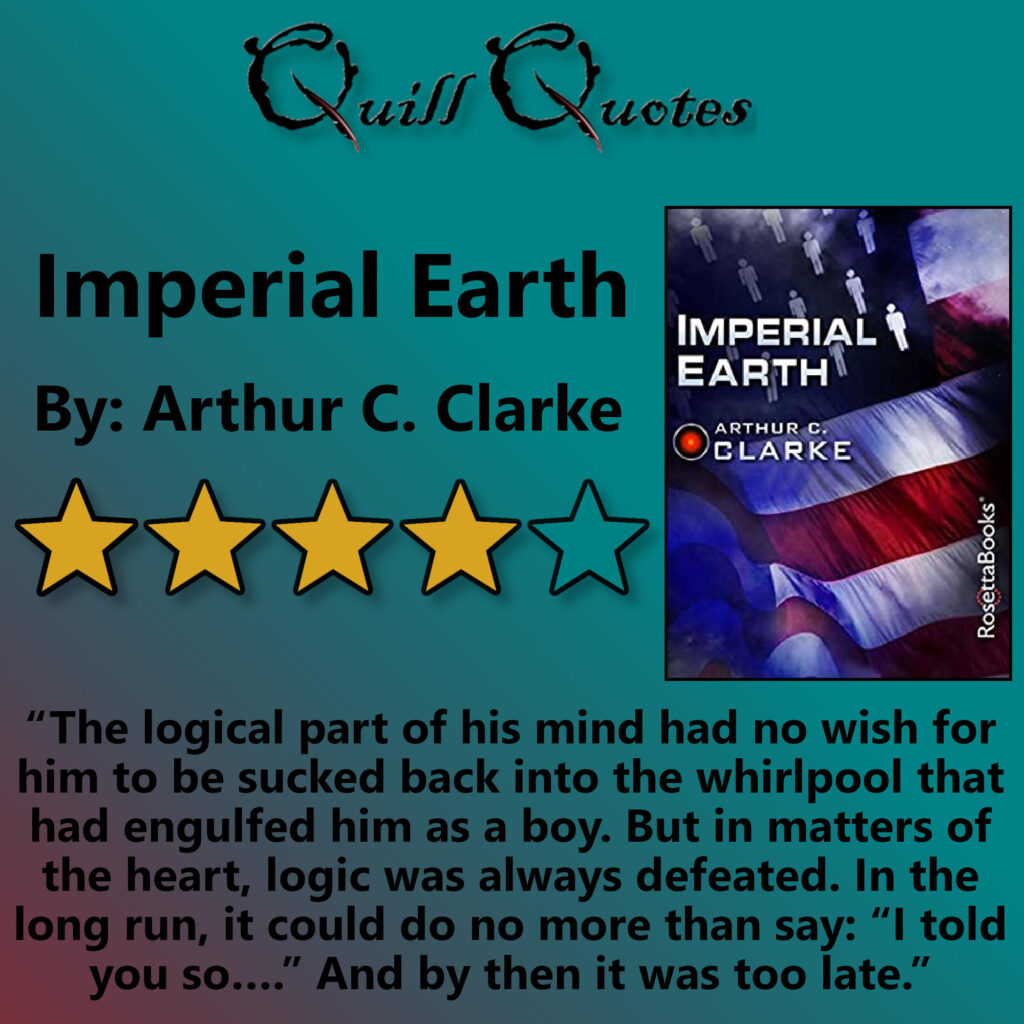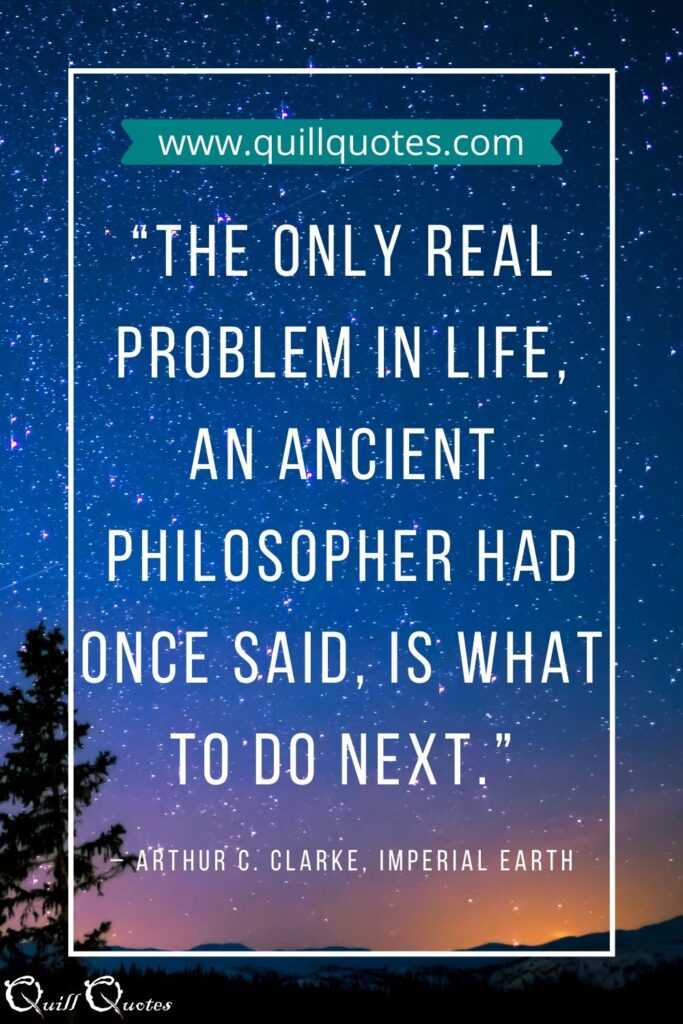I really enjoyed reading Imperial Earth by Arthur C. Clarke! It’s not as grandiose as many of his other works, taking place solely in our solar system in the not too distant future, but has a unique charm. I can’t quite place what’s different about this one but think it has to do with there being less of a lesson to take away and just a generally enjoyable story!

Book Stats
- Title: Imperial Earth
- Author: Arthur C. Clarke
- Genre: Science Fiction
- Publication Date: Sept. 18, 1975
- Pages: 272
- Est. Reading Time: 8 hours
- My Rating: 4/5 Stars
- Buy Now: Amazon
Imperial Earth: Plot Summary
Imperial Earth tells the story of Duncan Makenzie’s once in a lifetime trip to Earth from his home on Saturn’s moon, Titan. As a member of Titan’s “First Family”, Duncan is invited to Earth as a diplomatic guest to speak at the United States’ Quincentennial in the year 2276. Due to the high costs of interplanetary travel and difficulty adapting to Earth’s higher gravity this will likely be Duncan’s only opportunity to visit Earth and he plans to take full advantage. Along with his ambassadorial duties, Duncan plans to see as many of Earth’s sights as he can, reunite with a childhood love, and make arrangements to continue his family’s legacy. However, when he learns of a Titanian plot outside of his government’s knowledge, he quickly becomes involved in something much bigger than he’d bargained for.
Imperial Earth: My Thoughts
As I mentioned above, I didn’t notice an overarching lesson or theme as is typical of the science fiction I usually read. Instead, I simply enjoyed the story and characterizations on a more emotional level. The book really feels like something that could happen in the near future and a snapshot of their lives rather than an overly hopeful or dystopian picture.
Long-Distance Communication
One aspect I found particularly interesting in the context of today’s remote work and Zoom meetings, is the importance of face to face meetings to interplanetary politics. As the youngest member of the Makenzie family and the only one to have never visited Earth, Duncan is the clear choice to be sent to the Quincentennial and establish his professional network. Arthur C. Clarke accurately predicted our advancements in technology that would allow near-instantaneous communication all around the world but also expected miscommunications to occur when people don’t know each other personally. I’ve found this to be very true, especially with e-mail where the tone and intent can often be misinterpreted even by close friends.
“No man could be taken seriously in the arena of Solar politics unless he was personally acquainted with the key figures of Terran affairs, and had traced his way at least once through the labyrinth of the terrestrial bureaucracy.”
– Arthur C. Clarke, Imperial Earth
Clarke then took the analogy further to liken space colonies, where a time delay would be unavoidable and travel uncommon due to the huge distances, to the period of European colonization on Earth:
“In those days, the countries on Earth were almost as far apart as the planets. Well, some of them. The most perfect analogy is the old British Commonwealth, the first and last world empire. For almost a hundred years, countries like Canada, India, and Australia relied entirely on steamships to link them to Britain; the one-way journey could easily take a month or more, and was often a once-in-a-lifetime affair. Only the wealthy, or people on official business, could afford it.”
– Arthur C. Clarke, Imperial Earth
Commercial Space Flight
I also really liked the quote below that summarizes the challenge faced by Elon Musk and SpaceX in the pursuit of creating a colony on Mars. Unfortunately, Clarke was somewhat over-optimistic in his timeline (stating “the first manned ship touched down on Titan in 2015”) but I’m hopeful the “takeoff point” he mentioned is coming soon!
“In fact, it goes back to the very beginnings of astronautics, in the twentieth century. We couldn’t have commercial space flight until there were flourishing extraterrestrial colonies—and we couldn’t have colonies until there was commercial space transportation. In this sort of bootstrap situation, you have a very slow growth rate until you reach the takeoff point. Then, quite suddenly, the curves start shooting upward, and you’re in business.”
– Arthur C. Clarke, Imperial Earth
Imperial Earth: Favorite Quotes
I highlighted a lot of quotes on this read and really struggled to narrow down my favorites, so bear with me. Many of them have some wisdom to share and others I just found too funny not to include!
“Time gained is time created.”
“The first few weeks, for example, were mostly occupied by experiments in zero-gravity sex, despite warnings that this was an expensive addiction for those compelled to spend most of their lives on planetary surfaces.”
“When it’s inevitable, relax and enjoy it.”
“The sincerity of a speech of thanks is often inversely proportional to its length.”
“The logical part of his mind had no wish for him to be sucked back into the whirlpool that had engulfed him as a boy. But in matters of the heart, logic was always defeated. In the long run, it could do no more than say: “I told you so….” And by then it was too late.”
“The story of the Titanic’s first and last voyage is one that has to be told anew in every generation, lest men forget the workings of fate and chance.”
“Some problems could be solved only by time, if indeed they could be solved at all.”
“Not everything rare is valuable—but everything valuable is rare.”
“The only real problem in life, an ancient philosopher had once said, is what to do next.”
“Had anyone ever gone mad by visualizing each ejaculation as a hundred million murders?”
“All knowledge was a two-edged sword, and it might well be that any messages from the stars would not be to the liking of the human race.”

Imperial Earth: Final Thoughts
In the acknowledgements, Clarke notes that he himself used many quotes from this book in an actual address to U.S. Congress, which is awesome!
“When, on July 24, 1975, I appeared as a witness before the House of Representatives Subcommittee on Space Science, I was able to quote extensively from Duncan’s address to Congress in Chapter 41. Thus the House of Representatives’ hearings now contain extracts from the Congressional Record for July 4, 2276, which should cause confusion among future historians.”
– Arthur C. Clarke, Imperial Earth, Acknowledgements and Notes
Duncan’s address is primarily geared toward continuing technological advancement and not being satisfied to remain in our solar system and dwell on the achievements of the past. We haven’t even colonized our solar system yet but still need to avoid becoming complacent and keep pushing advancement. Sadly, space colonies never became a reality in Clarke’s lifetime like he thought, but I’m hopeful that they will in mine!
Have you read Imperial Earth or any of Arthur C. Clarke’s other works? Which is your favorite of his books? I’ve liked everything I’ve read by him but think I slightly prefer The City and the Stars and Rama series to this one.


Loved reading your thoughts on this book. Haven’t read sci-fi in agse but this book sounds interesting!
I don’t usually read sci-fi, but it sounds really interesting. I agree that virtual communication is a wonderful tool, but it still cannot totally replace of an eye-to-eye first meeting. Great review! Thanks for sharing!